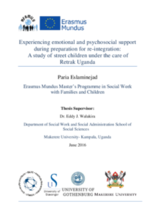ABSTRACT
This thesis investigates children’s experience of psychosocial and emotional support of (nonparental) caregivers in residential facilities in preparation for their re-integration into family based care. The thesis urges that successful preparation of ‘street children’ for re-integration into family based care requires professional psychosocial and emotional support.The author uses Bowlby’s attachment theory as well as Rogers’ humanistic theory of a therapeutic relationship to articulate children’s needs for emotional care on account of their varied experiences from the street life and/ or life before the street – some of which are traumatic in nature. Key concepts in Rogers’ humanistic approach including congruence, empathy and unconditional positive regard are identified to be central in a caregiver-client relationship in order to achieve positive effects.
In order to study this preparation phase for children’s re-integration, interviews with (former) street children, caregivers, management personnel at the Uganda-based institution "Retrak" (which focuses on the work with highly vulnerable children) as well as administrative personnel of Uganda's Gender, Labour and Social Development Ministry have been conducted. The analysis of the interviews showed that the aspects of time, trust and therapeutic relationship are seen by the caregivers as well as by the former street children as relevant factor for preparation of successful re-integration. Only by sufficient inclusion of these aspects, children are enabled to overcome traumatic experiences and build a strong and open relationship with the caregivers. This again is the basis for the children's selfactualization and empowerment to overcome potential barriers, which hinder re-integration.
However, the interviews have shown that several factors inhibit the full inclusion of the relevant factors time, trust and therapeutic relationship in the work with the children (e.g. lack of expert personnel to work with highly traumatized children, understaffing, underfinancing, problems in creating trust relationships with children who do not open up towards the social workers). Therefore, the thesis concludes with recommendations, how these obstacles could be overcome, providing for better re-integration results.

